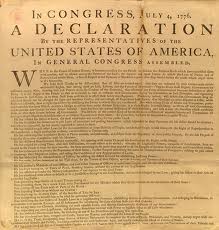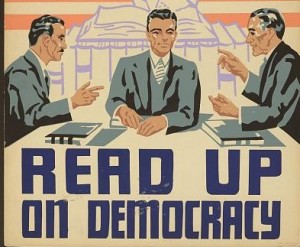
Can democrats learn from Machiavelli?
When politicians are described today as ‘Machiavellian’ the implication is that they are no more than cynical graspers at power for its own sake. Most historians of political thought have long argued that Machiavelli’s own views and politics were more complex than this. In his 2011 book, Machiavellian Democracy (previously reviewed for OurKingdom by Guy Aitchison), the political theorist John P. McCormick offers an innovative reading of Machiavelli. According to McCormick, Machiavelli was not only a republican thinker, but by the standards of his day, and our own, a radically democratic one. Moreover, some of Machiavelli’s ideas, such as his advocacy of plebeian, tribunate institutions, arguably remain relevant to today’s discussions of democratic renewal. Robert Jubb and Stuart White interview John here for the ‘Democratic Wealth’ series.

Reparations: What should happen at the end of empire?
While political theorists have long supported redistribution of economic benefits within states, many have denied global redistribution out of a state-centric theory. Reparations and their nexus to global justice have thus become a hot topic in the world of contemporary political theory. Dr Dan Butt’s recent presentation, ‘Reparations and the End of Empire’, at the Oxford Department of Politics and International Relation’s ‘Engagement of Theory Conference’, makes a cogent case for the connection between past and present actions on a moral level – leading to the necessity of reparation payments between states in a post-colonial world. In order to make such a claim, Butt’s wide-ranging presentation had some serious questions to answer. Who was harmed and who benefited from past injustices? Can mere involuntary receipt of benefits give rise to reparative responsibility? Can we ‘inherit’ responsibility from previous generations? If we pay reparations, do we pay them to survivors or their descendants?
Butt posits that there are three ways that the past connects with contemporary moral obligations: through (1) entitlement, (2) benefit and (3) responsibility. Entitlement is the most straightforward, but it is also limited in the sense that it is something tangible taken from another. It means that quite literally one has possession of property owed to another. Benefit consists of any benefits stemming from injustice, which could be automatic or direct, voluntary or involuntary. Lastly, responsibility is the active responsibility for an ongoing injustice in connection with another, ongoing failure to fulfill rectificatory duties over time.

Moving away from the end of history to a sustainable history
Two decades ago, the ‘End of History’, à la Francis Fukuyama, seemed a plausible prediction for many in the West. At least, it was a prophecy many hoped would turn into a self-fulfilling prophecy. In the climate of reinvigorated faith in the virtues of liberal democracy post-1989, freedom and democracy were two common buzzwords that indeed seem to carry a strong promise for the future. They also seemed indissolubly linked and interchangeable.
Western-type liberal democracy in its current form remains the most tested and successful accountable governance model in history. However, as a slogan for global political change in the 21st century, it needs to be re-examined both in terms of its applicability to all forms of societies and for making current democratic societies more inclusive. The range of events now in the spotlight of international relations – such as the Arab Spring – has further emphasized that the bid for leadership change, be it highly authoritarian, might in fact be premised on a quest for something more wholesome than just political freedom.

Are we endowed with natural rights?
Are we endowed with Natural Rights from the day we are born? Are these rights conferred to us by God or Nature notwithstanding and beyond any legal rights prevailing at any given time?
Theists may argue that Natural Rights are conferred by Divine power. Theists may sincerely hold that belief. However, both agnostics and atheists may argue otherwise. Theists may be able to argue their case rationally. But so long as Natural Rights bestowed by Divine power cannot be proven empirically, this stance can only constitute a belief in Natural Rights and not an objectively verifiable existence of Natural Rights.
Others may argue that Nature confers on all newly-born individuals Rights that are independent of human-made legally-derived rights. Again, those espousing such a view may sincerely hold that belief. But, as in the case of Devine power-derived- rights, this stance cannot be proven empirically and thus can only represent a belief in Natural Rights rather than an objectively verifiable existence of Natural Rights.
This is not to belittle the enormous power of belief in human affairs; far from it. Belief may be a powerfully motivating force. Thus, a belief in Natural Rights can cause social, political and legal changes; some of these changes may be seen by contemporary protagonists and/or by future generations as historical landmarks.
However, a belief in Natural Rights, notwithstanding their causal effect, cannot by itself be a proof to the effect that these rights actually exist.

Liberty, Liberalism and Surveillance: a Q&A with Quentin Skinner
One of England’s most distinguished scholars, Quentin Skinner is a leading historian of political thought and an outstanding advocate of a contemporary republican viewpoint. This interview with Richard Marshall of 3:AM sets out an accessible overview of a lifetime of work. We are grateful to 3:AM for letting us republish it as part of Politics and Spires’ Democractic Wealth series. Open Democracy, our series partner, added at the end two additional questions about corporate power, surveillance and freedom. Skinner’s answer with respect to surveillance is a strong, clear statement of how it is a threat to liberty. This is especially relevant to current affairs given the superficiality of official and in particular British media responses to the Snowden revelations published by the Guardian’s Glenn Greenwald about the programmes of total surveillance being attempted by US and UK secret services.
RM: You are known as a leading historian of political history and in particular the formation of ideas around human liberty. One of the key ideas you’ve written about is what you label ‘neo-Roman’ liberty’. This began back in Ancient Rome didn’t it, where freedom was contrasted with slavery, wasn’t it? Can you tell us what its distinctive traits are?
QS: The vision of personal freedom that interests me is articulated most clearly in the Digest of Roman Law, which is why I have wanted to describe its later manifestations as examples of ‘neo-Roman’ liberty. The fundamental distinction drawn at the outset of the Digest is between the liber homo, the free person, and the servus or slave. The law needed to begin with this contrast because law applies only to free persons, not to slaves. So one crucial question was: what makes a slave? The answer given in the legal texts is that a slave is someone who is in potestate, in the power of a master. The contrast is with someone who is sui iuris, able to act in their own right. Long before these argument were summarised in the legal texts, they had been elaborated by a number of Roman moralists and historians, above all Sallust, Livy and Tacitus. These writers were interested in the broader question of what it means to say of individuals – or even of whole bodies of people – that they have been made to live in the manner of slaves. The answer they give is that, if you are subject to the arbitrary will of anyone else, such that you are dependent on their mere goodwill, then you may be said to be living in servitude, however elevated may be your position in society. So, for example, Tacitus speaks of the servitude of the entire senatorial class under the Emperor Tiberius, so wholly subject were they to his lethal caprice.

Finding the future of democracy in the past
There are two different questions that might be asked about contemporary democracy: how did we get here? And where else might we have tried to get? A great deal of the ‘history of democracy’’ is written in the former mode, with the classical world and subsequent periods being identified as steps in a path towards a modern democratic world in which the people elect their governments and hold them accountable to greater or lesser extents. In Britain, the normal staging posts identified are the Levellers, the 1790s, the Great Reform Act, and the suffragist movement. In America they are the Declaration of Independence in 1776, the Federal Constitution of 1788, Jacksonian Democracy in the 1830s, the Civil War, and the Voting Rights act of 1965. In France, the French Revolution, 1830, 1848, 1871, 1836, and 1944. Ireland has far fewer dates!
This sort of history is in effect being written backwards; it is a history of the present and how we got to it, not a history of the past, and what we might have fought for. One mark of this approach is that relatively little attention is given to the language people actually used; if we think their aspirations were democratic then it is assumed that we can describe their goal as democracy, even if they didn’t use the word. Moreover, since we link democracy to elections, we assume that the history of democratic aspiration was primarily a story of struggle over the suffrage. But much of this does violence to the evidence.

Is there a radical politics of virtue?
In today’s commercial republics, the “commercial” and the “republican” seem to be at odds. Commerce generates vast inequalities of wealth; the labor market generates overwork, underemployment, and precariousness; citizens are subject to myriad forms of coercion, surveillance and discipline. Yet a republic is supposed to uphold the freedom and equality of its citizens. Worse yet, the tradition of ‘republican’ political thinking seems to have only extreme answers available to it. In the name of protecting the virtue of its citizens, republicanism has often been hostile to the very idea of commerce. The production and accumulation of wealth, the enjoyment of luxury and leisure, are seen as corrupting private pursuits, drawing citizens away from public life and fracturing any sense of shared commitment to equality and the common good. The only solution is radical regulation. Impose severe restrictions on the production and consumption of wealth, eliminate wealth and poverty, and impose relative uniformity in economic activity. This was the classical republican solution, and neo-republicans have not done much to dislodge this view. As Jessica Kimpell put it in a previous post, “it would seem that contemporary thinkers would be even more vulnerable to this problem than classical republicans.”

The New Labour That Wasn’t: Lessons for Miliband
Labour currently faces a period of challenging redefinition. New Labour is emphatically over and done. But as New Labour recedes into the past, it is possible to speak of a road not taken – the ‘New Labour That Wasn’t? And what relevance does it have for Labour today?









